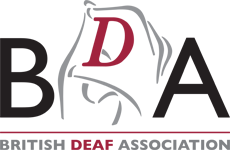Deaf charities are backing Strictly winner Rose Ayling Ellis’ call on the Government to provide free access to British Sign Language (BSL) lessons for the parents and guardians of all deaf children.
In tonight’s BBC1 documentary Signs for Change, Rose explores the world of deafness and meets Katie Littlejohns, whose son Alvie, two, has moderate deafness.
With the support of the British Deaf Association and the National Deaf Children’s Society, Katie set up a petition calling for free BSL tuition for the families of deaf children, which received almost 27,000 signatures.
The Government response to the petition was that BSL lessons are available via adult education budget funding, but the two charities say that many families do not qualify, cannot access the appropriate courses, or find they are already oversubscribed.
Martin McLean, the National Deaf Children’s Society’s Senior Policy Advisor, said:
“Sign language can help ensure and support effective communication within families with deaf children. However, the funding earmarked by local authorities for BSL tuition is insufficient, meaning that most parents wanting to learn BSL to any meaningful level will have to fork out hundreds, sometimes thousands, of pounds in tuition fees.
“The funding is also inconsistent. Some local authorities provide funding for BSL tuition, while others don’t, leading to a postcode lottery. This risks preventing many parents from creating a fully inclusive home environment to enable their children to thrive.
“Amidst the cost-of-living crisis, it is wrong that families may have to choose between learning a language that is vital for their children, or simply paying their electricity bill.
“The Government must make sure local authorities have the money to offer free sign language classes for families of deaf children as early as possible, no matter where they live in the UK.”
BSL is a visual, three-dimensional language that uses the signer’s full body to communicate. It has no written form. The British Deaf Association led the campaign for BSL to be finally recognised in law as a language of England, Scotland and Wales by the BSL Act on 28 April 2022, after decades of campaigning by the deaf community.
Rebecca Mansell, Chief Executive of the British Deaf Association said:
“We believe that deaf children have the human right to learn sign language from birth, including alongside English (a bilingual approach) and with, or without, hearing technology.
“There is so much interest in BSL out there. It absolutely skyrocketed after Rose Ayling-Ellis won Strictly Come Dancing in 2021. Every hearing person I meet says: ‘I’ve always wanted to learn to sign!
“A BSL GCSE is in development and should be ready by September 2025, but we think we should start even earlier and teach children about the British deaf community’s language and culture as soon as they start school.
“Too many doctors, audiologists, Teachers of the Deaf and speech and language therapists try to persuade the parents and carers of deaf children not to learn sign language to communicate with them. They believe that using BSL will affect their ability to acquire speech.
“In fact, the opposite is true. Gaining a strong language foundation such as BSL at an early age makes it easier for the deaf child to learn English later. Whether or not a child has a cochlear implant or hearing aid, learning BSL will always be beneficial as they will be able to communicate immediately and will become a part of the deaf community with a shared language and culture.”
There is evidence of widespread language deprivation among deaf people, which has lifelong damaging effects on cognitive development and mental health. Language deprivation is when a child receives inadequate language input during the critical first few years of its life.
The National Deaf Children’s Society also believes early access to language is vital for deaf children to develop and thrive. Without it, deaf children are at a huge disadvantage, and risk ongoing challenges throughout their lives.
In 2022, the British Sign Language Bill was passed, recognising BSL as an official language of England, Scotland and Wales. The Department for Education in England is also working towards a new BSL GCSE qualification, which it says will be available in schools from September 2025.
ENDS


